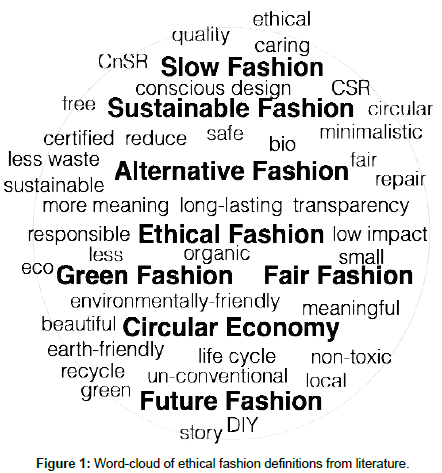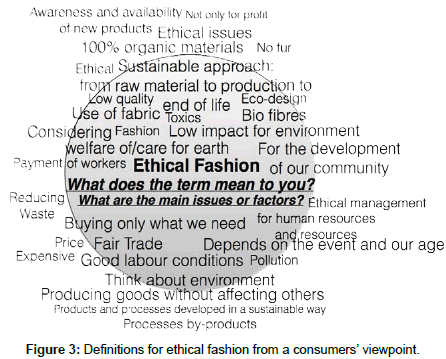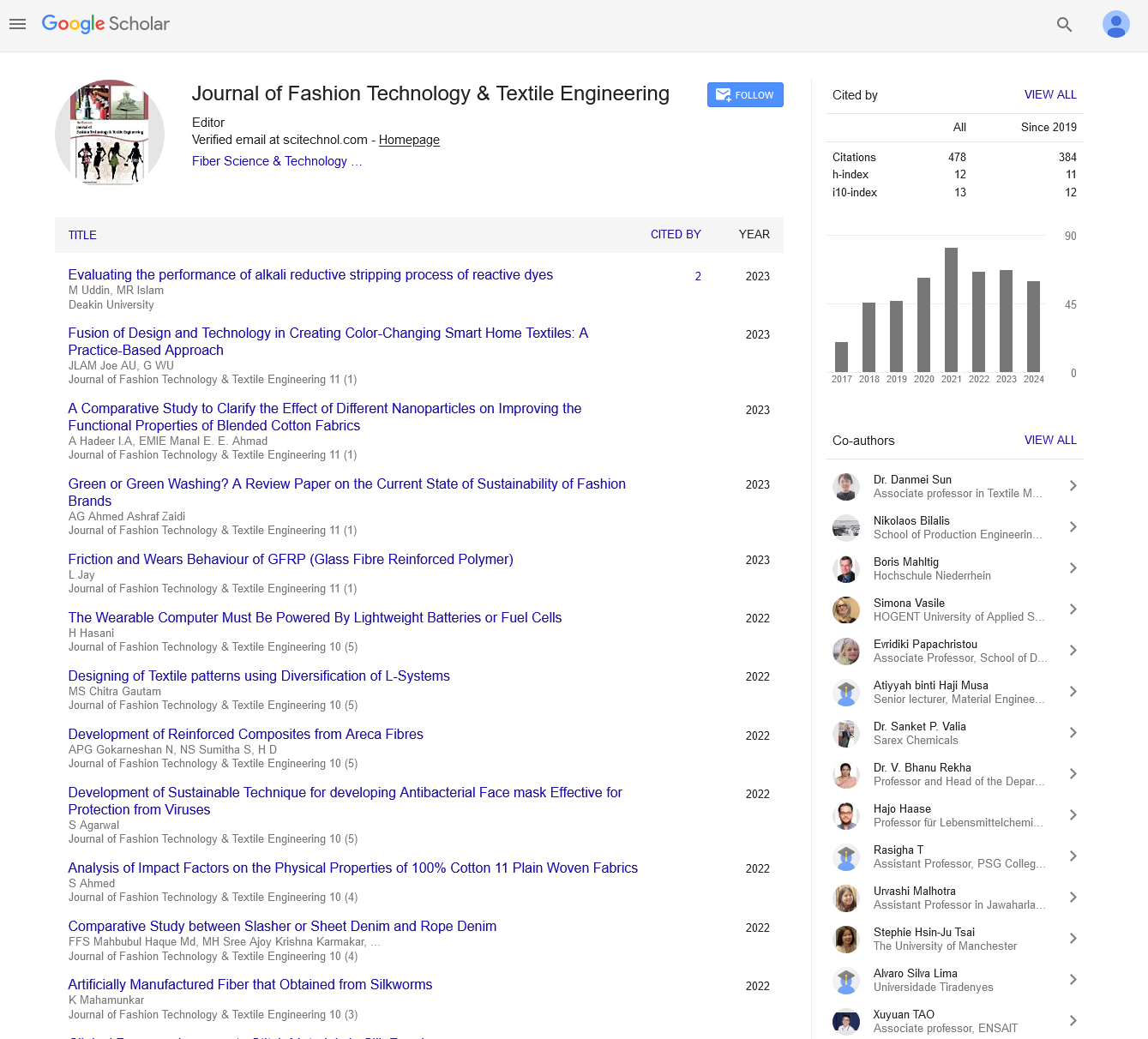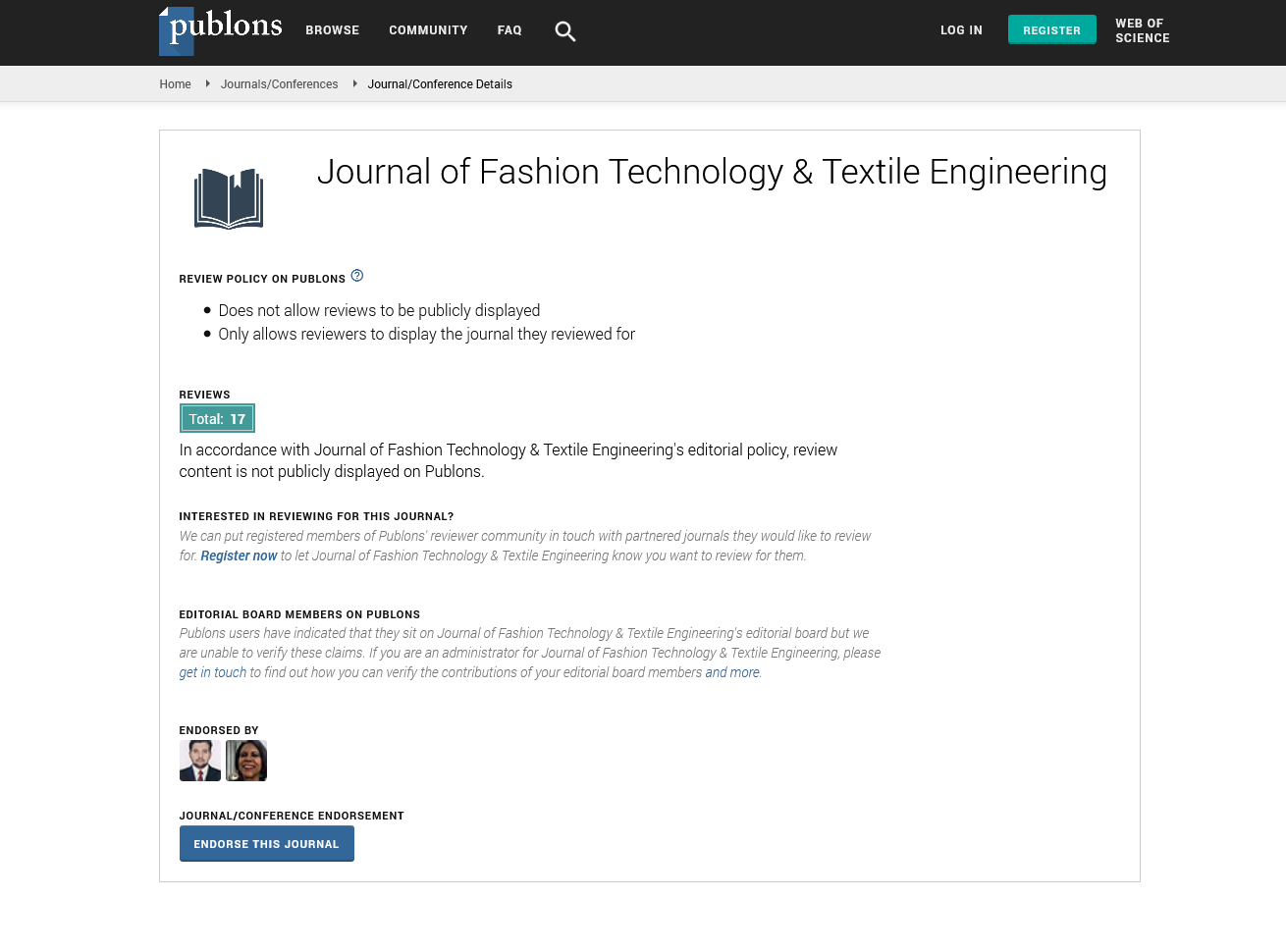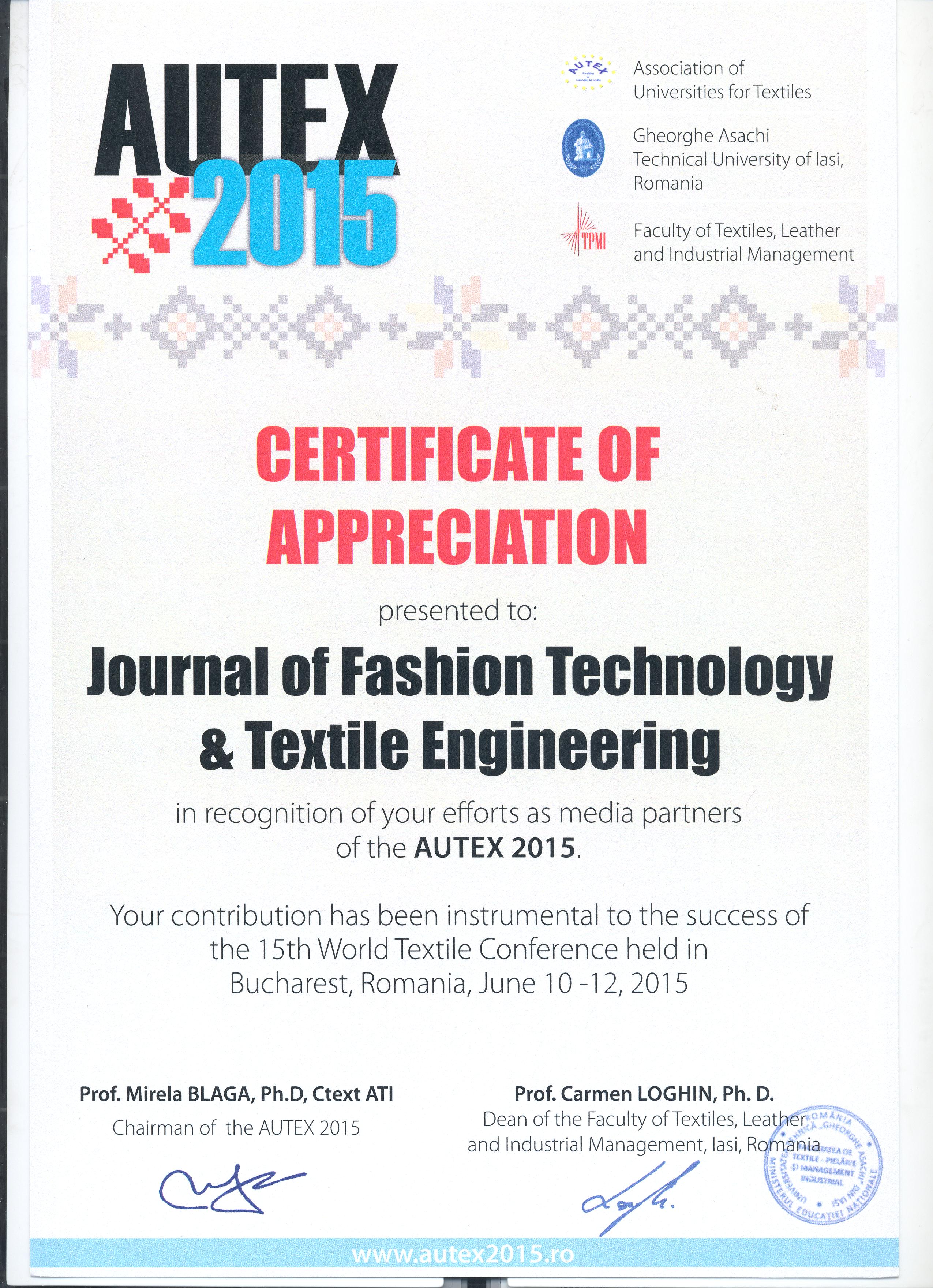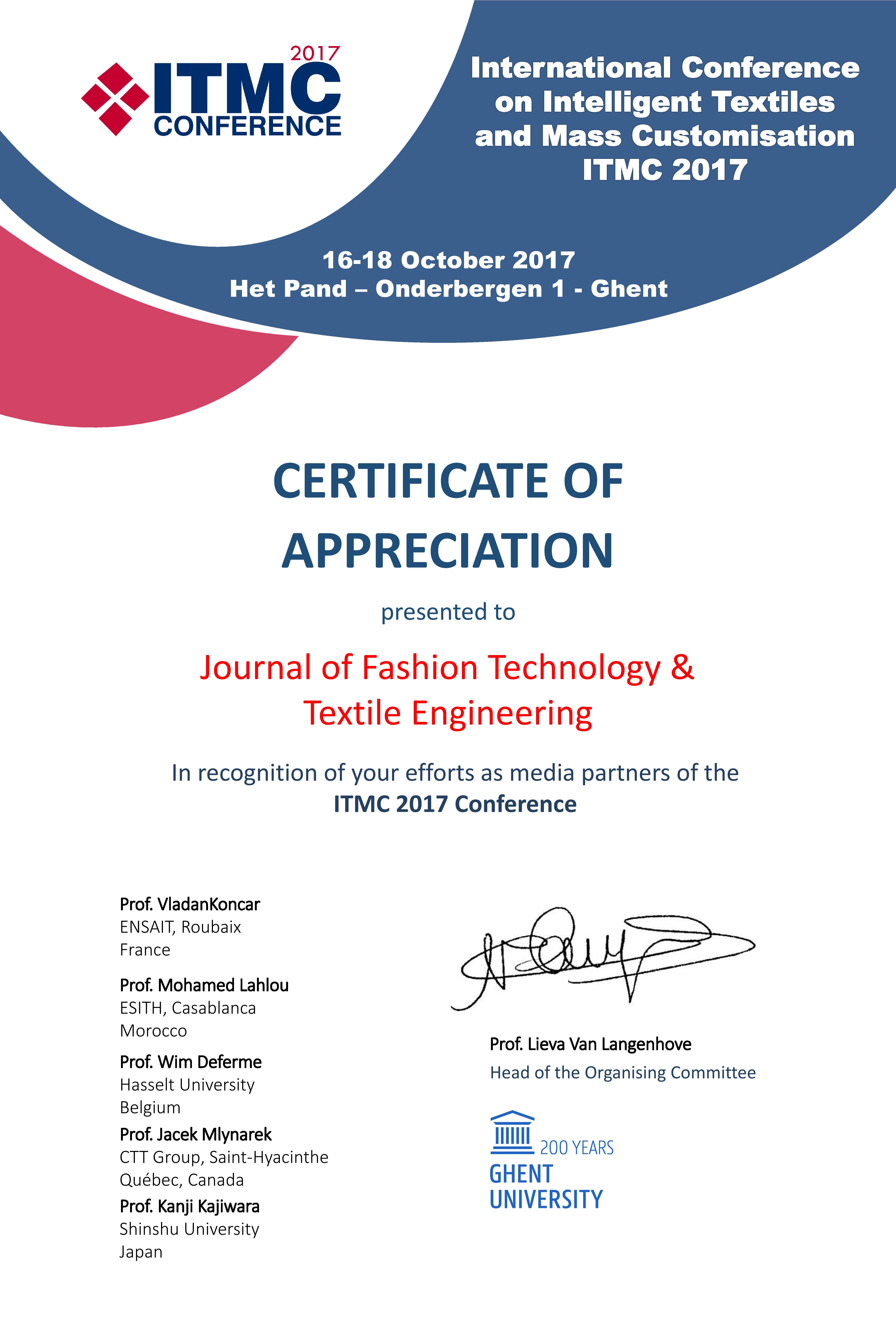Research Article, J Fashion Technol Textile Eng Vol: 6 Issue: 1
Qualitative Analysis of Open- Ended Questions to Define Awareness of Ethical Fashion in Romania
Melissa Wagner1-3*, Sebastien Thomassey2, Xianyi Zeng3 and Antonela Curteza1
1Faculty of Textiles, Leather and Industrial Management, Gheorghe Asachi Technical University of Iasi, Romania
2ENSAIT, 2 Allée Louise et Victor Champier, 59100 Roubaix, France
3Soochow University, College of Textile and Clothing Engineering, Suzhou 215021, China
*Corresponding Author : Melissa Wagner
Faculty of Textiles, Leather and Industrial Management, Gheorghe Asachi Technical University of Iasi, B-dul. D. Mangeron Nr. 67, 700050, Iasi, Romania
E-mail: melissa.wagner@tuiasi.ro
Received: Janaury 16, 2018 Accepted: February 10, 2018 Published: February 15, 2018
Citation: Wagner M, Thomassey S, Zeng X, Curteza A (2018) Qualitative Analysis of Open-Ended Questions to Define Awareness of Ethical Fashion in Romania. J Fashion Technol Textile Eng 6:1. doi:10.4172/2329-9568.1000167
Abstract
This research focuses on consumer behaviour analysis of Romanians as there is a lack of knowledge about their awareness of ethical fashion. The fashion industry and its concept of fast fashion, have negative impacts on the environment and society. The concept of slow or ethical fashion evolved, but consumer behaviour is important to reduce the impacts. Research in consumer behaviour aims at identifying consumer attitudes and consumption patterns. To understand customers and their expectations are increasingly important for the fashion business. This approach can analyse consumer awareness of ethics in fashion among Romanians from
an everyday perspective. The author conducted a cross-sectional study, a semi-structured focus group discussion with twenty participants during an organised workshop at a Romanian university using the city of Iasi exemplarily to represent a greater urban area. The dynamic panel discussions stimulated the data collection, including the author as a moderator directing the conversation. Simultaneously, a survey containing qualitative items, i.e., six openended questions, was carried out. This paper discusses findings from this qualitative analysis, focusing on phrases and words most commonly mentioned by the respondents. Data is based on fourteen participants to gather the perception and knowledge of the ethical fashion concept. Results of this empirical social research show that the responses support the theory of ethical fashion, but awareness is limited, and barriers towards sustainable consumption exist, this aligns with existing literature. This study serves as a preliminary research revealing a variety of conclusions and can be useful for further quantitative survey design.
Keywords: Consumer awareness; Ethical fashion; Perception; Qualitative analysis; Open-ended questions
Introduction
The fashion industry is one of the largest polluters globally, and generally, the interest in sustainability has risen in the last decade. Ethical fashion is an emerging concept opposite to fast fashion. Simultaneously, researchers have been increasingly focusing on consumers' interest in ethical behaviour. Customers worldwide care more about the social and environmental responsibility of companies, according to studies such as the Nielsen report [1]. Ethical fashion is increasingly gaining media attention, especially from social media and their influencers and celebrities, e.g., the documentary The True Cost. According to Vogue, sustainability has become a key issue in fashion industry over the past year”. Many companies are concerned about their impact on society and environment, such as H&M and Kering who have initiated a garment-recycling program [2]. Commonly, companies are incorporating ethics in their Corporate Social Responsibility (CSR) strategies or departments [3].
The ethical fashion concepts
Ethical fashion aims not to harm people or the environment; it also improves the working conditions for people, focusing on both, the culture and the environment [4]. Besides ethical, there are many other related terms, such as eco, organic, green, sustainable, or slow fashion. The slow fashion concept evolved from the slow food movement, focusing on local and small producers [5]. According to the definition of slow fashion [6], this concept is about small lines and regional productions, or high quality of products obtained through eco-design, as well as fair labour conditions. Other important aspects of this approach are innovation and transparency. Examples of the use of alternative fibres and production technology are to reduce the environmental impact by creating less waste and pollution [3]. By integrating ethics and sustainability into the design process, ethical fashion can provide more conscious products. Other terms to describe the alternative fashion concept are circular or circular economy [7], sweat-free [5], and social responsibility [8]. In Figure 1, a word-cloud presents most popular definitions of ethical fashion found in the literature.
Ethical behaviour
The definition of ethical is morally good or correct. In general, ethics affect pro-social behaviour; respondents of surveys about ethics are likely to give socially desirable answers, defined as the attitudebehaviour gap [9-12]. Therefore, even there is more concern about ethical issues, the behaviour is not affected, i.e., it does not drive towards sustainable purchase behaviour [10]. When it comes to fashion shopping, still, there are too many consumers with limited or no awareness of the potential issues regarding the sustainability of fashion products [13]. Hence, there is a need of consumer education for more awareness. It is necessary to understand consumers' perception regarding the concept of ethical fashion, by asking them “What is sustainable fashion?” [14], to reduce this attitude-behaviour gap, and also, to avoid negative perception, such as greenwashing, etc., [15].
Consumer awareness of ethics
The ethical trend is not entirely new; the first “ethical consumerism” appeared in the late 1980s, when “the retailers adopted codes of conduct to end relationships with suppliers who exploit workers, and set out to improve labour standards” [16]. However, regarding the ethical fashion concept, there is some confusion due to the overload and the continuous upcoming terms and shifting of meanings refer to Figure 1. Concluding, all concepts have the same aim, to improve or change the main existing fast fashion concept. By defining what ethical fashion means for consumers and how they characterise the related issues, such as purchase preferences, can help to predict their attitudes, and eventually their consumption practices.
Human beings can develop knowledge and perceive their environment by feeling, thinking, by creating emotions and thoughts, all these reflecting their awareness. Consumer awareness can be the understanding by an individual of a brand, the company’s performance, the services or products, or of their consumer rights; and awareness can have an impact on consumer behaviour. Consumers’ awareness [17,18], concern [18], as well as knowledge [19], influence behaviours and decisions. The awareness based on sustainability-focused values can trigger responses in the behaviour pattern [20]. Thus, the impact of sustainability depends on concern and the general level of awareness, Galbreth and Gosh [18] found that an increased level of awareness for sustainable products achieved through marketing strategies such as sustainability labelling initiatives, etc., can be beneficial for firms. Shen et al. [21] reported American consumers’ awareness of eight sustainable fashion dimensions, using a quantitative survey, among which respondents being most aware of recycle/vintage, followed by fair trade/locally made and less conscious of organic/vegan, and artisan/custom. However, the cultural context can influence consumer behaviour [22].
Awareness in Romania
In Central Europe, Romania is located in between Middle Europe, East Europe and the Balkan. The country was influenced by communism, by Ceausescu, which ended in 1989. Nowadays, it is becoming more western, also because of the industrialisation [23]; since 2004 Romania is a NATO-member, and since 01 January 2007 part of European Union (EU). According to the National Institute of Statistics [24], Romania is a country with one of the highest growth rates in the European Union (EU) in 2015, and 3.7% are mainly stimulated by domestic demand, cited in Lakatos et al. [25]. Still, the country faces challenges, e.g., recycling is still at its beginning, converting only 3% of the municipal waste, but aiming at 50% by 2020, according to Europe's 2020 Strategy [25,26].
Research on Romanians’ attitudes, specifically towards environmental protection, shows that consumers give some importance to it [25]. But, research on consumer awareness of ethical fashion in Romania is limited. Concluding, the question arises if Romanians are aware of the alternative fashion concept and how important are the ethical attributes in their fashion consumption? There might be still many consumers who have little interest in ethical behaviour and need more information [10]. Therefore, this study made the assumptions that, firstly, the concept of ethical fashion is not entirely understood by Romanian consumers and, secondly, that the interest is limited. Therefore, this user study focused on the analysis of consumer awareness through:
(1) Consumer understanding of the concept of ethical fashion,
(2) Consumer interest in ethical fashion.
Based on the literature review, the research model is presented in Figure 2, proposing the analysis of consumer awareness through several dimensions, and indicates the relationship between consumers’ awareness and consumers’ behaviour.
Six topics of the ethical fashion concept are formed based on existing literature [3,11,27,28] to study consumer awareness, representing the following dimensions: (1) Understanding of the concepts, conventional fashion and ethical fashion: definition, and production knowledge. Respondents were asked to define the concept and share their knowledge of the manufacturing process and issues in the fashion industry, as attitude can be affected by prior knowledge about the apparel industry [29]. (2) Fashion purchase history and personal relation: purchased product, and purchase reasoning. Respondents were asked about their last fashion shopping experiences, and which are the products and attributes considered most during the search process. Therefore, respondents were asked to recall their last recent purchase, to define the essential shopping characteristics. Participants were asked to refer only to the purchases which are done in the last half year [30], to achieve greater reliability. (3) Understanding of ethical indicators and consideration in the purchase: ethical product knowledge, and ethical issue preference. (4) The importance of ethical and non-ethical fashion attributes. (5) Future fashion and price sensitivity: consciousness about future developments, and price. (6) Ethical and non-ethical fashion retailers. Respondents were asked to identify retailers and brands, to determine their general level of awareness regarding the sustainability of products [18]. Additionally, on the demographic basis, a customer profile was collected such as gender, age, academic qualification, and occupation, as demographic variables can influence consumers' awareness, such as gender differences [28].
Materials and Methods
This study aims to describe the consumer awareness phenomenon for ethical fashion. The following type of design is proposed, a crosssectional survey of people’s current awareness. In word of mouth research, the use of non-retrospective surveys, i.e., cross-sectional surveys, has been found to be more reliable than retrospective studies [30]. An existing research literature on the phenomenon of ethical fashion in Romania is limited. Hence, the utilisation of qualitative design helps to explore the consumer awareness. The sample group consists of 20 male and female participants who were invited to an organised university workshop on the circular economy and open source in a Romanian university. Part of this workshop, was the focus group session [10,11] and the questionnaire [31] which took 60 minutes, [31]. This study was conducted with 15 out of the 20 participants, having 14 valid results from the open-ended survey; one invalid questionnaire was removed as the participant left early without completing the survey. The individuals taking part in this study were fashion and textile interested, having the basic knowledge for ethical products, and little information about the ethical fashion concept. During the whole time of carrying out the survey, an interviewer was available to ensure the complete answer to the open-ended questions and to give guidance where necessary.
This paper focuses on the findings obtained from the qualitative analysis of the open-ended questions, which discuss the most commonly mentioned content by participants. The open-ended questions were based on the literature review and the research model, as shown in Figure 2, using a stepwise design of the survey. Firstly, as part of the focus group session, the participants introduced themselves and discussed their background, followed by their professional experience. Then, from the survey questions, as shown in Table 1, the group was asked to define the ethical fashion term and related associations, and to give a written description, in their opinion. This self-administered survey resulted in 14 written response sheets, and 150 observations across the data set were obtained. Through qualitative analysis of the data sets, the word count frequencies were coded into themes, and relations among them were identified.
| (1) | (Ethical) Fashion | What does the term mean to you? What are the main issues or factors in fashion? |
| (2) | Fashion & You | What was your most recently bought item of clothing (for yourself or others)? What is its purpose, your reasoning (key factors)? |
| (3) | Ethical Fashion Purchase | Which ethical indicators do you know? When buying clothes which ethical issues do you consider most? |
| (4) | Fashion & Ethical Attributes | How important do you think are ethical factors for the purchasing decision? What is the ranking of ethics among other factors? |
| (5) | Fashion Future | What do you think will be the future development of ethics in fashion? If you would have more money would you be more interested (why/why not?) |
| (6) | Fashion Retailers | Having good ethics - Which do you know and why? Having absence of ethics - Which do you know and why? |
| Demographics | Gender: Male, Female Age Nationality Highest academic qualification obtained Occupation |
Table 1: Open-ended survey questions.
Results and Discussion
Survey respondents were Romanians living in the region of Moldavia, the age range was between 21-37 years, having more females (10x) than males (4x), and participants with a higher education degree, demographics are presented in Table 2.
| Participant (P) | Gender | Age | Academic qualification | Occupation |
|---|---|---|---|---|
| 1 | Male | 27 | PhD Student | Research Student |
| 2 | Female | 29 | High School | Student |
| 3 | Female | 22 | Bachelor Student | Student |
| 4 | Female | 21 | High School | Student |
| 5 | Female | 32 | Master Student | Assistant Student, Artist |
| 6 | Male | 37 | PhD Student | Professor |
| 7 | Male | 37 | PhD Student | University Lecturer |
| 8 | Female | 32 | PhD Student | University Lecturer |
| 9 | Female | 23 | High School | Student |
| 10 | Female | 22 | High School | Student |
| 11 | Male | 28 | Master Student | Assistant Professor |
| 12 | Female | 22 | Bachelor Student | Student |
| 13 | Female | 32 | Master Student | Student |
| 14 | Female | 22 | Bachelor Student | Student |
| Total | M (4) F (10) |
21-25 (6) 26-30 (3) 31-35 (3) 36-40 (2) |
High school (4) Bachelor (3) Master (3) PhD (4) |
Student (8) Research Student (1) Assistant Student (1) Assistant Professor (1) Lecturer (2) Professor (1) |
Table 2: Demographics of survey respondents.
The results are represented in terms of word counts (n) and themes, under six dimensions, namely, ethical fashion and: (1) concept knowledge, (2) purchase consciousness, (3) product attribute knowledge, (4) product attribute importance, (5) future consciousness, (6) (un/ethical) retailer knowledge.
Concept knowledge
The participants were asked to define ethical fashion and to compare it to the conventional fashion concept. Firstly, the importance of fashion, in general, was discussed with the most preferred answers among the participants (13 of 14 respondents) referring to “a good look”, and “a way to present yourself ”. Based on the word counts and coding, two main themes emerge aesthetical awareness and selfconsciousness. Quotations of the respondents were the following, for aesthetics: “to obtain different styles / styles to be fashionable / constant change / brand / aesthetically / a way of life / way of dressing / using our imagination (8), and for the self: “present / boost / individual presentation/ to express your personality to the world/ (help to) express yourself / mentally / investments” (7).
The problems in the conventional fashion concept were found to lie in fast fashion. This theme refers to quotes such as “fast changes / constant new fashion looks / fast changing trends” (3), and, additionally, seven respondents found other problems such as "low quality”, but “no value for money / too expensive” (4), and that “people buy too many / too cheap / disposable clothes / no reparation of old clothes / a need to repair and recycle more / throw and buy new” (6). The quotes refer to the definition of the contrary concept of slow fashion, and its aim of small lines, high quality and eco-design. Thus, participants have a good awareness level of the negative issues in the fast fashion industry, which arises due to low quality and fast changing offers of the product. Reflecting the aesthetical awareness theme, problems in fashion can occur as “fashion should always be “wearable / practical / good looking / fashionable” (4); but also “reduce electricity / toxic emissions” (2), and use “new / green materials” (3). Thus, respondents define the fast fashion concept with some environmental knowledge but are also highly aesthetically aware. This finding supports the idea of Joergens [10,20], in which the author reported that ethical fashion should be not only ethical but also attractive to be interesting for fashion buyers.
Under the section where the respondents are being asked “What is ethical fashion?” All responses demonstrated a good level of awareness of the term. In Figure 3, an example of a word-cloud was presented for the various definitions of the term ethical fashion, based on the data collection. Respondents linked the concept mainly to the themes low impact and minimalism, quoted as “considering welfare of earth / think about the environment / care for the environment / low impact on environment” (4), and “buying only what we need / what you really need” (2). Other answers reflect the theme of materials and production, quoted as “sustainable raw material / fabric / 100% organic materials / bio fibres” (4), and a “sustainable approach / sustainable from production to end of life / sustainable production (products and processes)” (4). Social issues were also discussed, such as the “development of our community”. There was an agreement regarding the need to “produce goods withoutaffecting others / ethical issues over profit / fair trade / good labour conditions for workers” (4). Another participant showed criticism of the concept, as the fashion choice is also “depending on human factors such as age, but also on occasion”.
The same participants who discussed the problems of low impact and minimalism mentioned that there is a concern of mainly waste and pollution issues in the fashion industry, such as “toxics / toxic waste / waste materials / pollution / chemical finishing / processes by-products” (7). Many participants agree that there is a need to “support the ethical fashion concept”, and recognise the need to make people more aware of the impact of consumption and the issues in the fashion industry, while maintaining “new products / eco-design / to be you / usage of materials / fashionable” (5). Also, many respondents were aware of the price for (ethical) fashion: “low quality products are more favoured than eco due to cheap price / money we spend, is important / higher costs for eco / expensive” (4). Again, social aspects are discussed, mainly focusing on “worker payment / under minimum payment of workers” (2), which has also been mentioned by researchers [32]. Proposals are made for both, consumers and the industry, such as “training for producers and consumers / ethical management for human resources and resources” (2). Thus, the study shows that the term ethical fashion is familiar to most. Respondents were showing aesthetical awareness and self-consciousness towards the fashion concept, and recognising the fast fashion issues, having some environmental knowledge. Responses to the ethical fashion concept refer mainly to a lower impact due to less consumption, and less waste and pollution, better materials and production processes, as well as appropriate social circumstances.
Purchase consciousness
The participants were asked to specify their most recently bought item of clothing, as this has seen to be a valid approach in research [30], to identify the primary product attributes regarding purchasing. The mainly bought items in the data set were the T-shirt, followed by the dress, quoted by participants as “T-shirt / T-shirt for my husband / shirt long sleeves” (5), and ”dress“ (4).
The key factor for the purchase was mainly the quality, connected with "long-lasting" of clothing; clothes are built to last [32]. All of the mentioned attributes are primary product qualities. A gender difference [28] was shown in the group. Men gave more “practical” reasons, such as “easy to use / good performance / need, to replace the old and broken clothes” (4); whereby women were looking for "fashionable" and "colour" in their clothes' purchases, due to "changing season or occasion" (2), but also for other important factors such as the "price" and "comfort". Quotations by participants are as follows: “quality / quality for apparel and shoes (last long period) / long-lasting / fabric quality / stitches” (6) and “colour” (4), ”material / natural materials” (3), "need of new and fashionable clothing / fashion / need to replace broken old clothes” (3), “upgrade wardrobe for hot season / summer is coming” (2), “prom ball / party” (2), “design / tailoring” (2), “price” (2), and “comfort / practical” (2).
Product attribute knowledge
The participants were asked to define the most important ethical attributes to gather the information regarding the product attribute knowledge which was material as well as human rights, along with "second-hand" (2). These attributes are quoted as follows: “materials / eco-friendly materials / eco materials / new and eco-friendly raw materials” (5), and “not harming the environment / respecting environment / environmental friendly” (5), “good labour conditions for workers / not abusing labour / respecting human rights” (3).
Next, participants were asked "When buying clothes which ethical issues do you consider most?" In response to this question, consumers discuss how the product is made of and where it is manufactured. Responses were quoted as follows: "made of / recycled material / comfort and material / organic” (4), and “manufactured in / produced outside countries having problems with labour rights / country of origin / who made my clothes / ethical pay for workers” (5). The importance of recycling, fair trade, made of, and organic has also been found in other studies, referring to the awareness rating mentioned by Shen et al. [20]. Participants knew about the campaign of “Who made my clothes?” (3) (#whomademyclothes) of the Fashion Revolution Week [33], this shows the impact of marketing campaigns and social media. However, from the results of product knowledge, it can be seen that mainly the material side, product origin and human rights were considered. Others, such as natural or low impact dyes, or maintenance criteria were not considered. Therefore, eco-friendly materials and the country of origin could mostly influence the buying process, see Table 3 for an overview.
| Eco materials | Environmentally-friendly |
|---|---|
| recycled material comfort organic |
harmless second-hand |
| Country of origin | Good labour conditions |
| who made my clothes low wage countries |
human rights ethical pay |
Table 3: Factors affecting the purchasing of ethical fashion items.
Product attribute importance
The importance of the ethical factors regarding the purchasing decision is mainly quoted as “very important / very” (4), “7 out of 10 / some importance” (2). The impact of consumption was considered and quoted as “we can choose to do something good for the environment in a long term / we have to be conscious / aware of the surroundings / have to take care of the planet we have” (4). When the subjects were asked to compare and rank ethics with other factors, the most common answer was the price. Eco is "more expensive", quoted as: "depends on the price we want to spend as eco is more expensive / second after price / after quality and price” (3). Follow by "price, quality and functionality", "comfort" was also found to be more important. As previously mentioned, ethical issues are not always the primary driver; For example, personal needs can be more important than ethics [20]. Even when consumers are aware of ethical issues, but still other factors, such as design, price, availability and the brand can have more importance in buying process [8,11]. Other respondents mention that ethics are not important, or that they are unsure about it, quoted as: “I must admit, not very high / Not very high” (2) and, “I don’t know” (2).
Future consciousness
When respondents were asked about the fashions’ future development regarding ethics, optimism was expressed. Participants mentioned positive trends such as “recycling, organic, upcycling", quoted as: "fair trade clothes / ethics in fashion will be hopefully more and more important / in top score / bigger importance of environment / considering environment will have a bigger importance / more fairness towards employees / more and more important / more support of sustainable development in peoples’ communities” (8), and “more recycled plastic-PET-fibres / more organic materials such as bamboo / upcycle your own wardrobe” (3). On the other hand, participants showed uncertainty towards present trends. As defined by Hofstede [22], Romania was categorised as restraint, showing a tendency of pessimism and feeling that social norms constrain actions. However, participants show more optimism towards the future ethical fashion.
The participants were asked if they would have more money they would be more interested to purchase ethical fashion. Almost all said “yes”, namely quoted as: “Yes, because it is important to take care of our environment / Yes, because it is more expensive to buy clothes that are eco-friendly / Yes, I would like to try / I am curious / Yes, due to environment” (6), and “I would buy higher quality products to use them longer / buy quality product which lasts for a long period such as in earlier times” (2). Therefore, a higher price or the perception that ethical fashion is costlier than conventional fashion can be a main barrier of the ethical concept.
(Un/ethical) retailer knowledge
The involved participants could not identify fashion retailers having good ethics, except “H&M". Along with that, the participants mention in general the term "big brand names" or "no-name brands". Quoted by participants as: “H&M-sustainable line” (2), and “I’m not aware of this topic / don’t know about this / I don’t know anyone that I could consider having good ethics (from my definition of good ethics)” (3), and “big brands especially/important brands” (2). Also, for non-ethical retailers, no names were found, and the only country of origin and working conditions, in general, were considered. Nine respondents didn't comment this question. And only five respondents gave the answers, quoted as “poor countries producers / bad working conditions for employees / low priced companies, producers mostly” (3), “No-name brands / H&M and Inditex” (2), “I’m not aware of this topic” (1). From the overall responses, it was observed that there was less or no awareness and uncertainty towards what is unethical or ethical retailers.
Conclusions
Fashion companies are increasingly implementing sustainable development, and ethical fashion is becoming more important [1,10]. The study findings show that the participants understand the concept of ethical fashion and the difference to the conventional system. But, other attributes than ethical, are found to be more important, such as mainly the higher price [8,11]. This finding can also relate to the cultural or economic values of Romanians. The knowledge about ethical retailers and the ethical attributes is limited; Retailers and brands need to take more action, especially the big brands such as H&M which are well known, but still, participants were less aware of their ethical practices. Campaigns such as "Who made my clothes?" can help to create more awareness, especially with social media. More education and information is needed [34]. Table 4 summarises the possible challenges, barriers and solutions extracted from the responses.
| Challenges | Barriers | Solutions |
|---|---|---|
| Reduce waste and pollution Improve human rights for workers |
Limited awareness No interest; Ethics comes second in consumer choice: too pricey, need for new Low availability of ethical retailers |
Aesthetic design Quality and value Made of, made by Training and education More retailers selling ethical fashion |
Table 4: Ethical fashion challenges, barriers and solutions identified.
Demographic differences were not significant. Solely for the purchase decision, men gave more practical reasons in comparison with women who tend to be more aware of fashionable issues. Regarding the retailer knowledge, mostly the older participants mention criticism on brands’ ethics. There is a possibility that the workshop about circular economy and demographical factors of the participants might influence the responses to some extent.
Using open-ended questions, this qualitative approach avoids a possible bias, found in closed-ended questions due to limitation of answers. This method allows the respondents to include their understanding of the subject of ethical fashion. In the survey responses, participants have included their opinion that they are not aware of some issues. The workshop event was also used to raise awareness among consumers for ethical fashion. Raising consumers’ awareness about clothing sustainability issues can subsequently alter their behaviour and influence the purchasing behaviour [13]. One proposal of participants was that driving the questions throughout the workshop is a better approach instead of continuously interviewing for a period.
Limitation of this research was the small sample size of 14 participants, and findings may not be generalised to the Romanian population. It was suggested to transform the results of the openended questions into questions for further quantitative research: This study can be considered as a preliminary approach to establish a closed-ended survey instrument, to develop the multiple-choice question. Concluding, this study intended to extend the general knowledge of the Romanian fashion consumer. The results can be valuable for other researchers to create their research based on the found emerged topics.
Acknowledgements
Funded by EU doctoral programs Erasmus Mundus Joint Doctorates (EMJDs) SMDTex - Sustainable Design and Management of Textiles.
References
- Nielsen (2014) Nielsen Global Survey on Corporate Social Responsibility.
- Vogue (2015) Save the Fashion Industry, Save the World! How We Can Make a Greener Future.
- Pookulangara S, Shephard A (2013) Slow fashion movement: Understanding consumer perceptions—An exploratory study. Journal of Retailing and Consumer Services. 20: 200-206.
- Thomas S (2008) From “Green Blur” to Ecofashion: Fashioning an Eco-lexicon. Fashion Theory. 12: 525-539.
- Kahn J (2009) Luxury-goods Makers Embrace Sustainability.
- Slow Fashion (2010) Slow Fashion Award.
- Ellen MacArthur Foundation (2015) Circular Economy.
- Dickson MA, Eckman M (2006) Social responsibility: The concept as defined by apparel and textile scholars. Clothing and Textiles Research Journal 24: 178-191.
- Auger P, Devinney TM (2007) Do What Consumers Say Matter? The Misalignment of Preferences with Unconstrained Ethical Intentions. Journal of Business Ethics 76: 361-383.
- Carrigan M, Attalla A (2001). The myth of the ethical consumer – do ethics matter in purchase behaviour? Journal of Consumer Marketing 18: 560-578.
- Joergens C (2006) Ethical fashion: myth or future trend? Journal of Fashion Marketing and Management: An International Journal 10: 360-371.
- Roberts JA (1996). Will the real socially responsible consumer please step forward? Business Horizons 39: 79-83.
- Goworek H, Fisher T, Woodward S, Hiller A (2012) The sustainable clothing market: an evaluation of potential strategies for UK retailers. International Journal of Retail & Distribution Management 40 935-955.
- Henninger CE, Alevizou PJ, Oates CJ (2016) What is sustainable fashion? Journal of Fashion Marketing and Management: An International Journal 20: 400-416.
- Rahman I, Park J, Chi C (2015) Consequences of 'greenwashing. International Journal of Contemporary Hospitality Management 27: 1054-1081.
- Forum for the future Fashion Futures 2025 (2010) Global Scenarios for a Sustainable Fashion Industry.
- Chartrand TL (2005) The Role of Conscious Awareness in Consumer Behavior. Journal of Consumer Psychology 15: 203-210.
- Galbreth MR, Ghosh B (2013) Competition and Sustainability: The Impact of Consumer Awareness. Decision Sciences 44: 127-159.
- Guo L, Meng X (2008) Consumer knowledge and its consequences: an international comparison. International Journal of Consumer Studies 32: 260-268.
- Buerke A, Straatmann T, Lin Hi N, Müller K (2016) Consumer awareness and sustainability-focused value orientation as motivating factors of responsible consumer behavior.
- Shen D, Richards J, Liu F (2013) Consumers’ Awareness of Sustainable Fashion. Marketing Management Journal 23: 134-147.
- Hofstede G, Hofstede GJ, Minkov M (2010) Cultures and Organizations: Software of the Mind. (3rd Edtn), McGraw Hill Professional, USA.
- Wolf A (2009) Kulturunterschiede in deutsch-rumänischen Kommunikationssituationen.
- Institutul National de Statisitica Comunicat de Presa (2014) Populatia Rezidenta la 1 Ianuarie 2014.
- Lakatos E, Dan V, Cioca L, Bacali L, Ciobanu A (2016) How Supportive Are Romanian Consumers of the Circular Economy Concept: A Survey. Sustainability 8: 789.
- European Environment Agency (EEA) (2016) Circular Economy in Europe Developing the Knowledge Base.
- Fletcher K (2008) Sustainable Fashion and Textiles: Design Journeys. Earthscan, London.
- Lai Z, Henninger CE, Alevizou PJ (2017) An Exploration of Consumers’ Perceptions Towards Sustainable Fashion – A Qualitative Study in the UK, in Sustainability in Fashion: A Cradle to Upcycle Approach.
- Bhaduri G, Ha-Brookshire JE (2011) Do Transparent Business Practices Pay? Exploration of Transparency and Consumer Purchase Intention. Cloth & Textiles Res J 29: 135-149.
- East R, Uncles MD (2008) In praise of retrospective surveys. Journal of Marketing Management 24: 929-944.
- Favier M (2013) Consumer attitude and behavior in the ethical fashion industry.
- Tran KTL (2008) Slow ride. Women’s Wear Daily 195: 18S.
- Fashion Revolution (2017) Fasion Revolution.
- Sproles GB, Geistfeld LV, Badenhop SB (1978) Informational Inputs as Influences on Efficient Consumer Decision-Making. Journal of Consumer Affairs 12: 88-103.
 Spanish
Spanish  Chinese
Chinese  Russian
Russian  German
German  French
French  Japanese
Japanese  Portuguese
Portuguese  Hindi
Hindi 